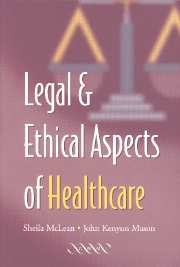Book contents
- Frontmatter
- Contents
- Acknowledgements
- Dedication
- Preface
- A Note on Abbreviations
- 1 About Medicine and the Law
- 2 Resources – Who Decides?
- 3 The Confidential Relationship
- 4 The Therapeutic Partnership
- 5 Refusal of Consent
- 6 Medical Negligence
- 7 Using People for Research
- 8 Assisted Reproduction
- 9 Genetics and Pregnancy
- 10 Termination of Pregnancy
- 11 Genetics, Insurance and Employment
- 12 Is Life Worth Living?
- 13 Disposal of the Body and Body Parts
- 14 Sex, Gender and the Law
- 15 Mental Health and Mental Capacity
- 16 The Law and the Elderly
- Index
14 - Sex, Gender and the Law
Published online by Cambridge University Press: 24 August 2009
- Frontmatter
- Contents
- Acknowledgements
- Dedication
- Preface
- A Note on Abbreviations
- 1 About Medicine and the Law
- 2 Resources – Who Decides?
- 3 The Confidential Relationship
- 4 The Therapeutic Partnership
- 5 Refusal of Consent
- 6 Medical Negligence
- 7 Using People for Research
- 8 Assisted Reproduction
- 9 Genetics and Pregnancy
- 10 Termination of Pregnancy
- 11 Genetics, Insurance and Employment
- 12 Is Life Worth Living?
- 13 Disposal of the Body and Body Parts
- 14 Sex, Gender and the Law
- 15 Mental Health and Mental Capacity
- 16 The Law and the Elderly
- Index
Summary
THE DIAGNOSIS OF SEX
In a very old but, nonetheless, influential article, Mr Justice Ormrod pointed out that ‘the law is relatively indifferent to a person's sex’ – and this is still true to-day. One can obtain employment, a driving licence or even a passport in whichever sex one wants to. Moreover, the criminal law is leaning the way of the civil law. Time was when rape could be committed only by a man on a woman; now, persons of either sex can rape those of the opposite or of the same sex – and the offence is no longer limited to penetration of the vulva.
Where, then, does any legal interest lie? An analysis of case law, together with the collateral statutory family law, leaves one in little doubt that, despite a relatively steady erosion of principle in accordance with changing moral attitudes, current public policy in the United Kingdom remains that of regarding the nuclear family as constituting a corner stone of our society. As a consequence, the law attaches very considerable importance to marriage which it defines as a union between ‘one man and one woman’. Sex is, therefore, an integral part of marriage and we will see that United Kingdom law has been resolute that the sex of a person is settled at birth and remains unchanged throughout life. The birth certificate is, therefore, an important document.
- Type
- Chapter
- Information
- Legal and Ethical Aspects of Healthcare , pp. 199 - 210Publisher: Cambridge University PressPrint publication year: 2003



